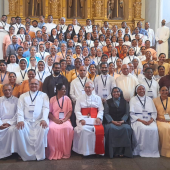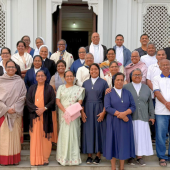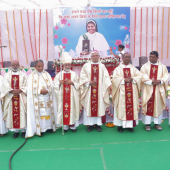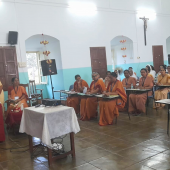Indian Government signs MoU with Caritas Cambodia
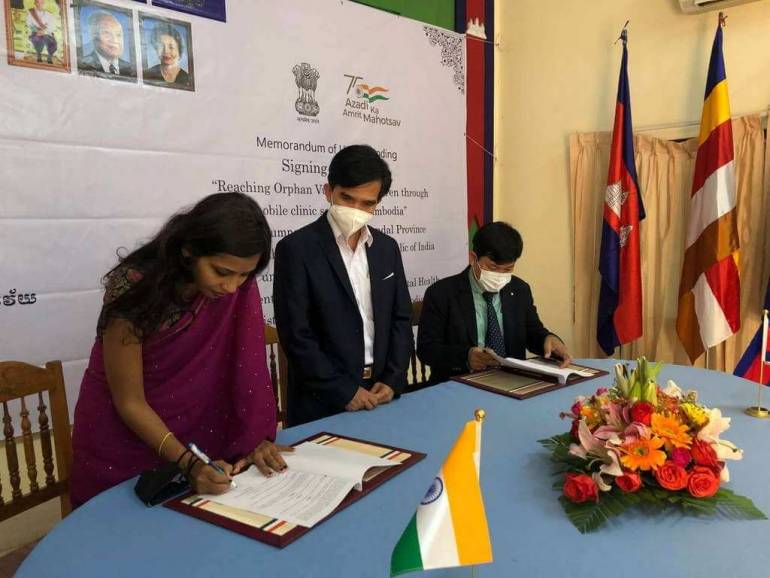
The Government of India and Caritas Cambodia signed a Memorandum of Understanding (MoU) for reaching orphan and vulnerable children through mobile clinic services in Cambodia.
Kim Rattana, executive director of Caritas Cambodia and Devyani Khobragade, Ambassador of India to the Kingdom of Cambodia, signed an MoU, on March 18, 2022.
The mobile clinic service will be available at Chhey Chumneas Hospital, Kandal Province, Cambodia.
The event was also attended by other dignitaries from the Ministry of Health, representatives from the Kandal Provincial Health Department and the Chey Chumneas Referral Hospital (CRH), Takhmau, Kandal Province.
Speaking on the occasion, Rattana thanked the Government and the Embassy of India for providing grants for this project that would be beneficial for orphans and vulnerable children, children with psychological disabilities and left-behind children.
Rattana particularly thanked the Ambassador for her continuous support and cooperation that has been extended to the Center for Child and Adolescent Mental Health (CCAMH) over the years.
In his welcome address, Dr. Bhoomikumar highlighted the ‘contextual relevance of this project, as it aims to reach children with neurodevelopmental and other psychosocial disabilities that are unable to access health care services due to the COVID-19 pandemic.
While expressing her appreciation for the signing of the MoU, Khobragade recalled the age-old bonds of friendship, particularly with the Chey Chumneas Referral Hospital (CRH), Takhmau, Kandal Province.
She appreciated the role of Dr. Bhoomikumar in developing child mental health services in Cambodia with the support of the Government of India.
She stressed the positive impact of QIP projects towards the enhancement of the overall bilateral relationship and goodwill between the people of India and Cambodia.
The Indian Ambassador to Cambodia also added that it is her chief endeavor to support projects, which will have a direct impact on the lives of people who are marginalized and below the poverty line, women and children in particular.
She underscored the contribution of the Government of India to the Ministry of Health, Royal Government of Cambodia to overcome the pandemic through vaccine delivery and the potential partnership in the transfer of technology and know-how in vaccine production in Cambodia soon.
Ms. Sok Dearozet, the community Program Manager of the CCAMH office said that with the recently the signed project, the Government of India has provided a mobile van and CCAMH staff training in India.
Ms. Sok told Radio Veritas Asia on March 21 that the mobile vehicle helps for transportation of families of children with disabilities that have to come to Takhmao (CCAMH) for monthly medical treatment and for CCAMH staff who provide counseling services at villages.
She added that the center's current program has helped 60 families with children with intellectual and mental disabilities in 18 villages in Chamkar Leu districts of Tbong Khmum province and Orang Ov district of Kampong Cham Province about 300 km from the capital of Phnom Penh.
"Most of us meet children with intellectual disabilities who cannot move even their hands or legs or have seizures," she said, adding, “Their families are farmers and poor fishermen.”
Ms. Sok stated that due to the poor family situation, every month, the center pays for transportation to the children's families who bring their children for medical check-ups and treatment at CCAMH in Takhmao City, Kandal Province.
She said that every month the CCAMH staff go to the two districts and search for disabled children if found that they have other needs or other diseases to be treated, the organization will send them to a partner.
“In case of finding a child with mental health, we consult with the family, teach the parents, train them directly and ask them to join our program of CCAMH,” she said.
She added, “We also have a group of parents and two village volunteers in each village. We have a total of 36 people in 18 villages.
She said that with this project to help children with mental health, the Government of India has supported since 2019 by training human resources in the country and abroad from the National Institute for Empowerment of People with Multiple Disabilities in India. India provides funds for the publication of documents related to projects for children with disabilities, such as brochures and books.
According to a press release issued by the Indian Embassy in Cambodia on March 18, under the QIP, the Embassy of India undertook other projects in partnership with Caritas Cambodia viz “Capacity building of caregivers and professionals to empower children and adolescents with multiple disabilities and their families”, which is under the final stage of completion, benefitting about 1300 children and their families.
Under QIP Scheme, the Government of India implements 10 projects every year in Cambodia by providing funding of up to USD 50,000/- each per project.
Since 2015-16, India has approved 46 projects in the fields of IT, agriculture, health, sanitation, women’s empowerment, child welfare, rural development, social infrastructure (including capacity building), and the environment.
Out of 46 projects, 21 projects have already been completed and the remaining 25 projects are at various stages of execution. These projects have received an overwhelming response and created a distinct and visible impact not only among the beneficiaries but also in the larger community.
Radio Veritas Asia (RVA), a media platform of the Catholic Church, aims to share Christ. RVA started in 1969 as a continental Catholic radio station to serve Asian countries in their respective local language, thus earning the tag “the Voice of Asian Christianity.” Responding to the emerging context, RVA embraced media platforms to connect with the global Asian audience via its 21 language websites and various social media platforms.









